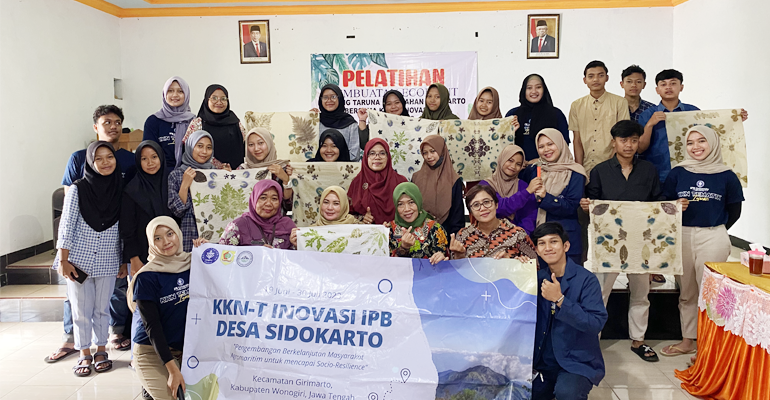Exploring the Potential of MSMEs in Sidokarto Village, IPB University Students Create Ecoprint Batik Making Training

In order to increase the potential of micro, small and medium enterprises (MSMEs) in Sidokarto Village, Girimarto District, Wonogiri, Central Java, students of the IPB University Innovation Real-Thematic Work Lecture (KKN-T) held an ecoprint training. The activity named ‘Peppermint’ aims to explore the potential of MSMEs through youth organizations by exploring the creativity of ecoprint batik art in Sidokarto Village.
“The training on ecoprint making is expected to become a potential business in Sidokarto Village, especially for youths and youth organizations in developing the potential of MSMEs in Sidokarto Village. Through ecoprinting, they can utilize resources from the surrounding environment into objects that have economic value, as well as explore more of the creative and artistic side of individuals,” said Indah Kusumaningrum, a member of the KKN-T Innovation team.
Indah explained that ecoprint is a printing technique emphasizing environmentally friendly principles by using natural materials from plants such as leaves, stems or flowers. The ecoprint technique uses ink made from natural pigments found in leaves, flowers or bark. As leaves and flowers have different shapes and sizes from each other, this can create unique and varied batiks.
“Ecoprint is often referred to as leaf batik. Each print created carries the natural traces of the materials used and illustrates the uniqueness of each process. By using natural materials, eco-friendly inks and alternative printing techniques, ecoprint combines art and sustainability,” she explains.
The Peppermint activity was attended by representatives of each area (RW or combined RW) consisting of Somopuro, Sunggingan, Weru, Nganom, Watuagung, Gambiran and Kwangsan. They were allowed to bring the ecoprints to their respective neighborhoods as a reference for further independent practice.
“The participants made ecoprints using two techniques, namely pounding and steaming. The leaves used were young teak leaves, papaya, cassava and others. One of the flowers used is the telang flower which can produce a blue color on the fabric,” said Indah.
Titik Supriyanti, SH, MHum as the Secretary of Girimarto Subdistrict who was also present expressed her hope and appreciation for the activity. She hoped ecoprinting could become a sustainable and useful business opportunity in Sidokarto Village. In addition, participants can spread the knowledge gained to their closest friends and family.
“When ecoprint is made with heart and art, it will produce extraordinary work. In addition, ecoprint is exclusive because we cannot make products with the same pattern. So, when we make ecoprints, we make unique and exclusive works, which in turn can increase economic value. Ecoprint can be made on bags, hats and clothes with extraordinary patterns,” she said.
“Lastly, thank you to the IPB University KKN-T Innovation students for organizing this activity. The youth organization members who have attended this activity are expected to seize opportunities and apply them in the future,” said Titik proudly. (*/Rz) (IAAS/ANF)



